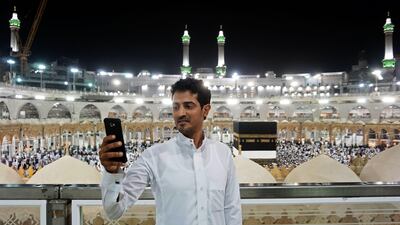For billions of Muslims who are physically and financially able, Hajj is a mandatory act of worship. But the religious celebration also has a substantial impact on the environment.
Environmentally aware worshippers want to reduce that impact and Muslims to adopt a greener lifestyle. Shanza Ali, 28, who chairs the UK-based group Muslim Climate Action says the |Hajj message of simplicity and the green credo have much in common, and tries to minimise her own carbon footprint during the six-day pilgrimage.The natural environment offers a way for her to draw closer to God.
"Hajj is all about living lightly and centring yourself around God," she said. We make many journeys in our life, and we go to many places, but this is the only journey that's physical, mental and spiritual. I think just reflecting on the fact you're with humanity, you see people from every corner of the world... That really makes you appreciate the idea that we're all sharing the Earth together."
For Husna Ahmad, author of "The Green Guide for Hajj", Muslims are doctrinally required to be stewards of the Earth. Tackling climate change is no longer about preserving the planet for future generations as its effects are evident now, she said.The majority of Muslims live outside Saudi Arabia and could collectively influence the greening of the sacred rituals.
"Consumer power is something that people need to think about in terms of flights, what they take, what they wear, the rubbish they throw, plastic bottles and all those sorts of things." she said. Muslims need to move away from a fast, disposable society, she added, with Hajj being the potential start of that journey.
Green City audit
In recent years, Saudi Arabia has taken steps to make Hajj kinder for the environment, such as setting quotas for pilgrim numbers and developing the Mecca metro system to limit pollution.
The Saudi Green Building Forum, a Riyadh-based non-governmental group recognised by the United Nations, has recently been tasked with auditing green efforts in Medina, the country's second holy city and, as the place where the Prophet Mohammad is buried, a site visited by millions of pilgrims. Secretary-general of the Forum, Faisal Alfadl said his team will measure the green credentials of the holy cities of Mecca, Medina and others against international guidelines on energy use, waste, water, transport and human well-being.
____________
More on Hajj:
Beyond the Headlines podcast: The spiritual side of Hajj the media rarely shows
Hajj pilgrims visit Mount Al Noor in Mecca - in pictures
Hajj 2017: All you need to know
104-year-old woman gears up for Hajj
How do pilgrims beat the heat during Hajj?
____________
He says he has noticed a shift in public attitudes. People now realise it is politically and culturally incorrect not to respect the environment.
"We have moved forward," he said.
Reviving traditional practices could help — for example, sharing water among pilgrims from a communal source, which was common before plastic bottles became ubiquitous.
And the white marble stones surrounding the central cube-shaped Kaaba building in Mecca naturally prevent the heat-island effect found in other urban areas, Mr Alfadl said.
Recycling may not be at the top of pilgrims' minds, but Muslims have a duty to recognise the creator of the environment and reflect on Islamic teachings not to harm animals, waste water or cut down trees unnecessarily, said Fatima Ragie of Green Deen South Africa, a Muslim environmental network.
Ms Ragie, who completed Hajj in 2009, urged greater efforts once the pilgrimage ends — for instance, ensuring food is not wasted when millions of animals are slaughtered for the start of Eid. More mosques and Muslim leaders should also speak up about climate change and the environment, she said.
Taking the message home
From Bangladesh to North Africa, climate change is a reality for many Muslims, as floods and droughts fuel instability and conflict, said Nana Firman, who participated in the United Nations climate talks in Morocco last year for the Global Muslim Climate Network.
"A lot of people feel like they don't know what to do, so it's really important that we engage (them)," she said.
Indonesia, with the world's largest Muslim population, has launched initiatives, from a phone app showing pilgrims how to enjoy a green Hajj, to offsetting carbon emissions from flights by planting trees, and limiting the number of times each person can undertake the pilgrimage.

